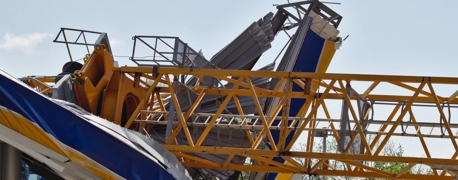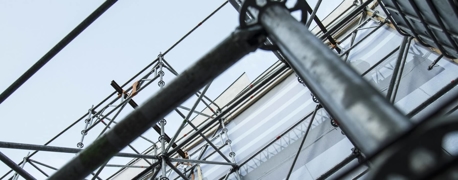Flash Burn & Welding Accidents

Over 500,000 people in America today work in one of the most dangerous occupations in one of the most dangerous industries: welding. Welders often face hazards like toxic exposure, electrical shock, and severe burns in addition to the many hazards all construction workers face. The most recent data on fatal welding accidents show that 1 in 250 welders will die from a welding-related injury at some point in their careers.
However, of all the injury risks welders face, we often get asked about one: "what's the number one accident in a welding shop?" Today's blog is about the biggest long-term injury welders face and what they can do to prevent a welding accident.
Flash Burn Is the Number One Accident in a Welding Shop
The number one accident that happens to welders is suffering flash burn—also known as welder's flash or arc eye. What happens in a flash burn injury is the UV radiation and infrared light radiation from a welding arc will burn the retina. UV damage will essentially give the eye a sunburn, and it takes a few hours to notice. Infrared damage, however, immediately feels like a scorching burn. Infrared radiation eventually causes cataracts.
In either case, radiation exposure will cost you time and money, both in medical care and lost time. Severe injuries could lead to permanent vision loss.
Flash Burn: Description, Symptoms & Treatment Options
Flash burn is caused by ultraviolet light exposure. Welding without proper eye protection is the most common cause of this injury, but it can also occur from exposure to sunlight or the glare of the sun off snow or water. This exposure can damage the cornea, which is the clear tissue that covers the front of the eyeball. Corneal flash burn, also called welder’s burn or photokeratitis, can be extremely painful.
The symptoms of flash burn may include:
- Mild to severe pain
- Light sensitivity
- Blurry vision
- Bloodshot eyes
- Extremely watery eyes
- The sensation of something in the eye
The treatment for flash burn may vary depending on the severity of corneal damage. Because the eyes are sensitive and must be treated with care, it is important to seek medical attention for flash burn before attempting any home treatment or remedies. Removing contact lenses and wearing sunglasses, however, can help with immediate comfort before one has the chance to seek medical care. A qualified eye doctor can conduct an examination to determine whether the cornea has been damaged and to what extent, and they can then recommend a treatment plan.
Treatment for flash burn may include:
- Using medicated eye drops to dilate the eye and relax the eye muscles
- Covering or patching the eye
- Applying cool compresses to reduce inflammation
- Keeping the eye lubricated with eye drops or gels
- Wearing sunglasses and avoiding bright lights or sunlight
- Taking prescription medication for pain, inflammation, and to prevent infection
- Follow-up appointments with an eye specialist to ensure the eye is healing properly
Flash Burn FAQ
Does flash burn go away?
In very mild cases, flash burn may go away on its own within a few days. Moderate to severe cases may take longer to heal, and medical intervention may be required to manage pain, avoid infection, and reduce inflammation. If you suspect flash burn, the best option is to seek treatment from a qualified medical professional.
What does flash burn feel like?
While every case is different, flash burn is typically painful and accompanied by blurry vision, light sensitivity, and the feeling that something is in the eye. The eyes may also be extremely watery.
How long does it take for flash burn to set in?
It may take anywhere from 3 to 12 hours after exposure to ultraviolet light for symptoms of flash burn to set in. Most of the time, both eyes will be affected.
Can flash burn be prevented?
Flash burn can be prevented by wearing proper eye protection. To prevent sunlight- or sun glare-induced flash burn, sunglasses with UV-A and UV-B protection may be sufficient. To prevent flash burn caused by welding, a welder’s mask or welder’s helmet is the best option. In fact, the Occupational Safety and Health Administration (OSHA) has set standards for welding work; employers are responsible for making sure proper personal protective equipment (PPE) is available for welders.
Other Common Welding Injuries
A little-known but just as catastrophic injury common to welders is hearing loss. Flying debris can strike the ear canal, damaging its fragile structures. Welders are also subjected to about 85 decibels of noise non-stop during the workday—roughly the same amount of sound as an idling bulldozer. Long periods of sustained high-decibel exposure can seriously damage the eardrums and lead to partial or total hearing loss later in life.
Managers should provide welders with earplugs or earmuffs and put up sound barriers to preserve their hearing. Welders should also have enough breaks to allow them relief from sustained periods of loud noise. For your sake, consider getting regular hearing tests—there are few things more dangerous on a construction site than to lose your hearing, a key part of your situational awareness.
How to Prevent a Welding Injury
As a rule, welders should leave their jewelry in their locker or at home. Protective boots, gloves, and overalls can decrease the likelihood of suffering electric shock. Additionally, if two welders are working on the same piece at the same time, they should be outside of each other's reach—managers should ensure they're not able to accidentally make contact with each other. Arc welders should also make it a habit to check their external connections to ensure cleanliness and tightness.
Welders can also avoid flash burn injury through specific equipment that should be provided by their supervisors. This equipment of course includes a welding hood and goggles, but it also includes a lens shade with appropriate filter strength, welding blinds, and helper glasses to help magnify the work surface without forcing welders to put their heads at an unsafe distance to the arc.
If lack of equipment or training led to your welding accident, speak with Houston welding injury lawyers at Arnold & Itkin LLP today. We've won billions for workers and their families, helping them get back on their feet after an accident. Learn your options and how we can help in a free consultation.
- Categories


